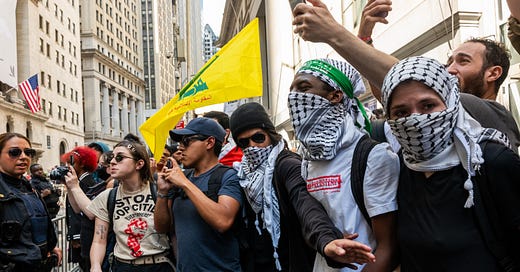In my most recent Dari class, my Kabul-based teacher and I spent an additional hour after our session talking about current events, mainly the repercussions of the Israel-Hamas war. These conversations generally shift my perspectives, as her viewpoints are oftentimes at odds with my initial assumptions of how she’d see things; in other words, they’re mentally enriching experiences for me.
But emotionally, I get the sense that her—and many other Afghans—feel they are screaming into the void from the future, albeit in vain, since much of the world (at least Americans) has grown weary of Afghanistan. I suppose too many of us either knew someone who served once, twice, or thrice or simply heard that it was the ‘graveyard of empires’ and decided that yes, after decades of America’s hobbling involvement, we certainly must have created quite an extensive cemetery.
While my teacher and I were talking, she mentioned that her and another student—a white man in Australia—were talking about the war in Gaza. This guy referred to Hamas as resistance fighters, not terrorists* and for a split second I had one of those “…….” moments. I had no idea what she’d say next: after all, I barely know what to expect half of my social network in the U.S to say, how could I make any correct assumptions about someone in Afghanistan?
This is when the conversation took a turn. She began to rail in her restrained-but-clearly-befuddled way against this student’s view, which only seems to reflect a growing sentiment in the West.
“How could Hamas be anything but a terrorist organization?” she protested.
“Girl, no clue,” I responded with incredible intelligence and deep insight.
She went on to share her concern that the West would eventually become the Middle East.
“I don’t get it, are Europeans and Americans just bored of freedom?”
I tried to give my own view-from-the-inside-of-the-upside-down, but even I was coming up short. It’s deeply concerning that so many young people in the U.S., Europe, Canada, and Australia are rallying behind the actions of Hamas: a group that will gladly sacrifice the people of Gaza for their cause.
And here is a woman who has lived under the world’s most repressive regime: she can’t continue her education, can’t work in most cases, can’t go many places without a male chaperone. “This is what will become of the West,” she said, referring to Afghanistan. At this point, she seemed to become emotional (it’s admittedly hard to read emotions over Google Meet, especially with a less-than-reliable internet connection….which is both *my* crappy internet *and* Kabul’s, oddly enough.) She said she didn’t believe she would be around long enough to see Afghanistan become free, but believed it would again, someday.
We have truly failed the people of Afghanistan, especially the women. To live in a society like the U.S. where half of the population seemingly holds progressive values and values women’s rights, we have failed to take seriously the stories of women like my teacher. It seems that many Afghans believe the world has forgotten them. Afghans who know firsthand what it means to live under the unrelenting suffocation of a terrorist organization-turned-governing body [twice], only to be told by white dudes Down Under that groups like Hamas are resistance fighters.
It’s time that we listen to those who live under—or have escaped from—regimes like the Taliban. We need to stop pretending White supremacy doesn’t also include silencing the voices of people who speak the truth about these realities that many here seem to glorify. It is two sides of the same coin.
And to answer my teacher’s question about whether we’re just bored of freedom, I’m not sure that’s quite it. I think in the U.S. ‘freedom’ has become so politicized and weaponized—a rallying cry for the Right and an allergic-reaction-inducing word for the Left. However the word is used, it’s a concept that we need to appreciate, protect, and exercise responsibly. Just because you can say something, doesn’t mean you should. But you can certainly lend your freedom as a megaphone for those who don’t have it.
P.S. - I’ve realized that this post is equal parts deflating and rage-inducing; at least, I would hope it is. I thought it’d be helpful to amend this blog post to end on a more positive note. Here are two things you can do to be an impactful ally:
Seek out perspectives that make you uncomfortable or make you think. This is more of a practice than an easy to-do, but I think it’s important.
Sign this petition to end gender apartheid in Iran and Afghanistan.






